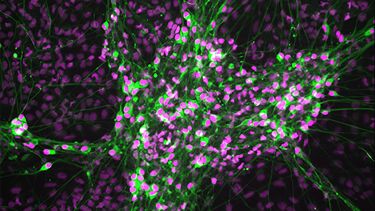A new study from scientists at the University of ∫˘¬´”∞“µ has discovered how vital neurons and cells that control the function of crucial organs develop in the womb.
The trunk neural crest is an important cell type which during embryonic development, gives rise to a family of “sympathetic” neurons that control the function of crucial organs, including the heart and hormone-producing cells of the adrenal gland. When “mutated”, these cell groups can lead to neuroblastoma, a rare type of cancer that affects babies and young children. But despite their importance, not much is known about how human trunk neural crest cells develop in the womb or how they produce neuroblastoma in some “abnormal” cases.
Using a petri-dish model, the research led by scientists from the Department of Biomedical Science at ∫˘¬´”∞“µ in collaboration with international partners set out to address the lack of knowledge in this vital area.
The team succeeded in generating relatively pure populations of trunk neural crest cells in the petri-dish from human pluripotent stem cells (hPSCs), unspecialised cells that resemble the early human embryo which can produce any cell type in the body when treated with the appropriate cocktails of chemicals. The researchers then found that petri-dish produced trunk neural crest cells could be efficiently converted into sympathetic neurons which have the same properties as their living counterparts.
Dr Anestis Tsakiridis, Group Leader for the Centre for Stem Cell Biology at ∫˘¬´”∞“µ said ‚ÄúOur work opens new avenues in the field of stem cell ‚Äúbioengineering‚Äù, providing the opportunity to understand better the biology of human trunk neural crest cells and neuroblastoma without the need to use animal models or primary human foetal tissue.‚Äù
The Centre for Stem Cell Biology at the University of ∫˘¬´”∞“µ brings together researchers focused on developing the basic biology and technology that will underpin the use of human Pluripotent Stem Cells for applications in medicine, whether for a direct use in regenerative medicine, or for disease modelling, drug discovery and toxicology.



